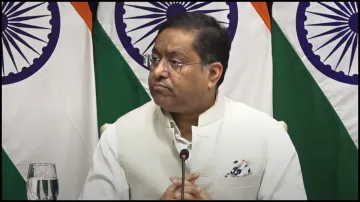'All Indian nationals safe and sound': MEA on Bangladesh's ongoing anti-quota protests
At least 39 people were killed and hundreds injured as police fired tear gas and rubber bullets to break up groups of protesters, who torched vehicles, police posts and other establishments. This is the most serious challenge to PM Sheikh Hasina's government after it was elected for a fourth term.

New Delhi: The Ministry of External Affairs on Friday said all Indian nationals are "safe and sound" in Bangladesh, which is witnessing violent protests over the quota system for government jobs, adding that they are in touch with appropriate authorities. The Ministry also said the ongoing protests are an internal matter of Bangladesh.
"We see this as an internal matter of Bangladesh. All our Indian nationals are safe there. We have a large student community of 8,500 students, many of them pursue medical education in that country. They are all safe and sound, and they are in touch with our High Commission and with our Assistant High Commission as well. We are regularly keeping in touch with them to render any assistance they may need," said MEA spokesperson Randhir Jaiswal in a regular press briefing.
There are 8,500 Indian students and 15,000 Indian nationals residing in Bangladesh, Jaiswal further said, adding that External Affairs Minister S Jaishankar is monitoring the situation and the high commission will be giving regular updates about the situation there. Police and security officials in Bangladesh fired bullets and tear gas at protesters and banned all gatherings in the capital on Friday amid violent protests in several areas.
What is happening in Bangladesh?
Police and security officials in Bangladesh fired bullets and tear gas at protesters and banned all gatherings in the capital on Friday amid violent protests in several areas. At least 50 people have been killed and hundreds have been injured in violent clashes as protesters demonstrated against the controversial quota system in Bangladesh's government jobs. Authorities cut off internet and mobile services after days of deadly clashes over the chaos. The violence has highlighted cracks in Bangladesh's governance and economy and the frustration of young graduates who face a lack of good jobs.
In a dramatic escalation, protesters in Bangladesh set fire to several government buildings, including the headquarters of the state television network, trapping numerous individuals inside the blazing building. Bangladesh's information minister told the BBC that broadcasts had been stopped and most employees had left the building in the capital.
Television news channels in Bangladesh were off the air and telecommunications were widely disrupted on Friday amid mostly deserted streets in Bangladesh on Friday following the violence seen on the previous day. According to outage monitor NetBlocks, Bangladesh was plunged into a "near-total" internet shutdown as night fell, with telephone and internet calls disrupted.
News television channels and state broadcaster BTV were off the air while entertainment channels continued normal transmission. Some news channels displayed a message which said they were not able to broadcast due to technical reasons and that programming would be back soon, as per a witness.
ALSO READ | Bangladesh: Protesters set ablaze state TV headquarters, several trapped inside amid massive stir: Report
What triggered the protests?
The nationwide agitation, the biggest since Hasina was re-elected earlier this year, has been fuelled by high youth unemployment. Protesters are demanding the state stop setting aside 30 per cent of government jobs for the families of people who fought in the 1971 war of independence from Pakistan. The demonstrations started last month after the High Court reinstated a quota system for government jobs, overturning a 2018 decision by Prime Minister Sheikh Hasina's government to scrap it.
The protesters have argued that the quota system is beneficial for supporters of Sheikh Hasina’s Awami League, which led the independence movement and called it a "discriminatory" move. Nearly 32 million young Bangladeshis are unemployed or without education out of a total population of 170 million people. Experts also attribute the unrest to stagnant job growth in the private sector, making public sector jobs, with their accompanying regular wage hikes and privileges, very attractive.
To make matters worse, Hasina refused meet the students' demands and used the term 'razakar' (volunteers) - a term used for those who allegedly collaborated with the Pakistani army during the 1971 war that perpetrated some of the worst atrocities during the war. The protests turned violent this week following clashes between thousands of anti-quota demonstrators and members of the student wing of Hasina's Awami League party.
(with inputs from agencies)
ALSO READ | Bangladesh violence: Death count rises to 39 in anti-quota protests, communications disrupted | WATCH